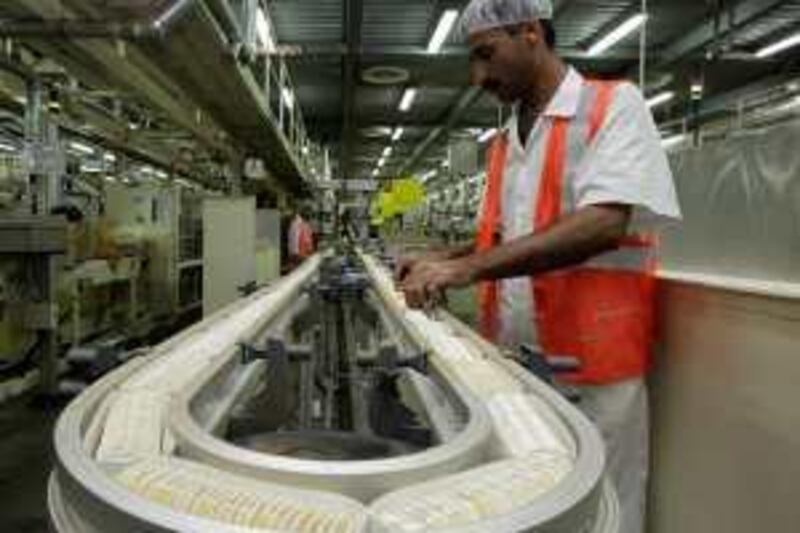Dubai's tea traders are finding that a cup of the world's favourite brew is just the thing to perk up business during the recession. "Our tea sales are holding steady," says Sanjiv Mehta, the chairman of the North Africa and Middle East division of Unilever, the multinational consumer products company. "They have not been affected by the recession or increased competition." At Unilever's Lipton tea factory in the Jebel Ali Free Zone, more than a dozen high-precision assembly machines work around the clock to fold, fill, stitch and package a million tea bags an hour.
That adds up to an annual output of seven billion tea bags, or about 180 sachets for every man, woman and child in the GCC. Although the factory, which opened 10 years ago, was originally developed to package and distribute brand-name tea products to local markets, it is now a global sourcing and distribution hub that exports to 53 countries as far afield as Canada and Australia. Annual production has increased five-fold to 25,000 tonnes from 5,000 tonnes over the past decade. Growth has continued this year, despite the recession.
"Good growth in tea underlines the strength of the Lipton brand," Unilever said in its results announcement for this year's first quarter, a period in which the company's net profits fell 43 per cent on the previous year. Dubai has proved an excellent location for the Lipton tea hub. It is convenient for importing bulk tea from Unilever's main suppliers in India, Sri Lanka and Kenya. The emirate's supportive business environment has also helped, Mr Mehta says.
Other tea distributors evidently concur, as increasing numbers have been setting up shop in Dubai. In February, the Dubai Tea Trading Centre (DTTC), a division of the Dubai Multi Commodities Centre, opened a tea storage and blending facility, with a capacity to store up to 5,000 tonnes of bulk teas at any given time and to blend 2,400 tonnes of tea a month. International tea traders have shown immense interest in using the facilities, says Sanjay Sethi, the head of the DTTC. "We are confident that the new centre will attract more tea traders and boost the volumes of tea traded through Dubai," he says.
The total weight of tea traded in the emirate reached 148,600 tonnes last year, up from 144,600 tonnes in 2007, and Mr Sethi expects another increase this year. If anything, the recession seems to be helping as consumers around the world shun fancier drinks in restaurants, bars and coffee shops, and instead stay at home sipping tea. "I decided to say 'yes' to the recession," Taz Tagore, a US blogger, wrote on the health-related website www.intent.com. "I forgo restaurant meals for tea dates at friends' homes." Tea-themed events are seeing a burst of popularity in the US, a nation better known for its devotion to coffee. To mark "Tax Day" on April 15 - the deadline for US residents to file tax returns - activists across the country organised dozens of "tea parties" as forums for public protests against the state of the economy and government fiscal policy. They were a nod to the Boston Tea Party, an anti-tax protest in 1773 which was the spark that led eventually to America winning independence from Britain.
But tea's rising popularity in the world's biggest economy is now being driven by stronger social forces than historical iconography. Bigelow Tea, a tea supplier based in Connecticut, forecasts a 7 per cent increase in US tea imports this year, as consumers continue to respond positively to reports of the drink's perceived health benefits. Between 1990 and last year, the US tea market grew almost fourfold, from US$1.84 billion (Dh6.75bn) to $7.3bn, says the Tea Association of the USA, an industry group. Sales are expected to more than double to $15bn a year by 2012, the president of the association, Joseph Simrany, told an international tea convention in India in February.
Tea consumption is also rising in countries that have been traditional strongholds for the beverage, including the UK, Iran and most Arab states, while in Russia, some cash-strapped consumers are switching to tea from cola, beer and vodka. Alexey Shvetsov of Ormi Traders in Moscow told the tea conference: "What else can people drink? People still drink tea as a healthy and traditional drink, and an obvious choice when you have less money."
"The only thing cheaper than tea is tap water," says Pradeep Jeyathilak of Unilever's UK division. "During the last recession, 50 per cent of households claimed to spend less on eating out. It is seen that people sit at home and drink more tea." In India, the world's second biggest tea exporter after Sri Lanka, tea prices are rising and growers are optimistic that demand for their product will increase this year, local media reports say.
Ravi Agarwal, a tea exporter, says: "The [Indian] tea industry has been under recession for the last seven to eight years. Last year, there was a boom. This year, we see another boom, which would be very good and healthy for the tea industry." @Email:tcarlisle@thenational.ae





